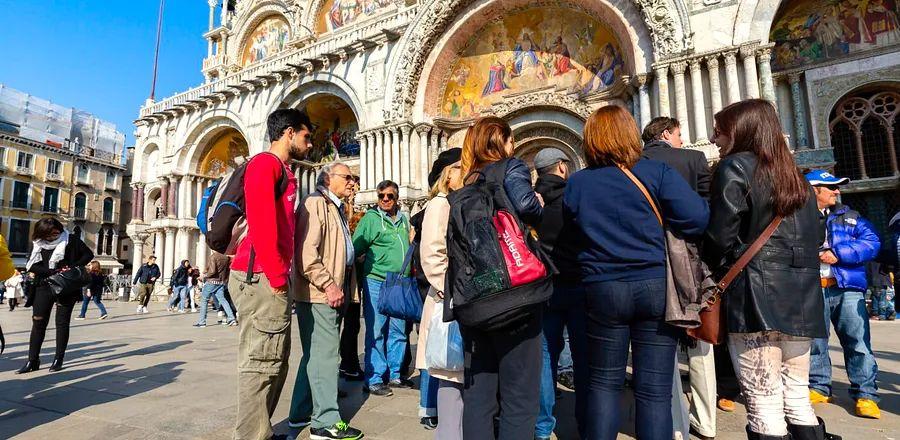Venice Implements New Visitor Rules to Combat Overtourism

Picture a summer in Venice free from the overwhelming presence of massive tour groups crowding the streets as they move between narrow calle. This vision is at the heart of the new limit on tour group sizes, recently endorsed by the Venice City Council to tackle the severe overtourism impacting the city.
Effective June 1, guided groups exploring Venice’s historic center and the islands of Murano, Burano, and Torcello will be restricted to a maximum of 25 participants. This is roughly half the capacity of a typical tour bus, which usually holds up to 50 passengers, targeting the large tour programs that increase foot traffic by land or sea from cruise ships.
The regulation does not specify if the limit pertains solely to walking tours or encompasses the total number of guests staying in Venice. Its goal is to alleviate pedestrian congestion on the city’s narrow streets and popular spots like Piazza San Marco and Murano’s Via del Giudecca. Additionally, it seeks to minimize noise pollution by prohibiting portable loudspeakers, requiring tour leaders to use their voices or employ whisper radio systems, portable microphones, and headsets connected via radio frequency, which many guides already utilize.
Elisabetta Pesce, Venice’s security councilor, described the new regulation as "a significant step towards enhancing group management . . . encouraging sustainable tourism and ensuring the city's protection and safety."
With tourism reaching unprecedented levels, many find the Venice experience less enjoyable than in previous years—over 11.3 million travelers passed through Venice Marco Polo Airport (VCE) last year, marking a 22 percent rise from 2022.
The city council believes that alleviating both physical and auditory congestion is crucial for enhancing visitors' experiences, improving the quality of life for locals, students, and workers, and safeguarding Venice’s delicate infrastructure. For years, Venice and its surrounding lagoon have faced threats from rising sea levels and extreme weather that lead to aqua alta (high water) and flooding, gradually damaging the islands, building foundations, and historic structures.
Pedestrian congestion exacerbates the situation, so part of the strategy involves tracking tourist flows to inform future initiatives. Overtourism contributes to pollution, depletion of resources, overloaded waste management, stressed water supplies, and inadequate drainage systems. Moreover, the growing number of tourists leads to increased water taxis and vaporetti, which further congest the lagoon and harm the environment.

Courtesy of Dan Novac/Unsplash
New Entry Fee for Venice
In the past year, the Venice City Council has taken significant steps to address the overtourism affecting the city. In September 2023, they announced the introduction of the Venice Access Fee, a charge aimed specifically at day visitors. This decision follows years of discussion on the matter, with the fee set to take effect on April 25, coinciding with the historic Festa di San Marco, celebrating Venice’s patron saint, Saint Mark.
“I regret that the ticket is essential: Our goal is not to close the city but to prevent it from being overwhelmed,” stated Venice mayor Luigi Brugnaro during a February 2 press conference. “The aim is to ease congestion, not to generate additional revenue. We need guidelines that respect Venice, a fragile city unlike any other.”
For those planning to visit La Serenissima this year, the Venice Access Fee will be tested over 29 selected days in the first half of 2024, from April 25 to May 5, and on all subsequent Saturdays and Sundays until July 14 (excluding June 1 and 2). Here is the complete calendar of dates for the fee.
However, don’t expect to find turnstiles or ticket booths. Instead, day visitors will need to register in advance online and purchase the five-euro entry ticket using a credit card or PayPal; they will receive a QR code as their ticket. Visitors must carry the ticket at all times, and it is reportedly refundable up to 24 hours before the date of entry. (This writer purchased a ticket for April 25 and has been unable to find the refund process—there’s no information in the FAQs section online and no additional details on the site.) Children aged 14 and under, as well as those with confirmed overnight hotel bookings in the Venice municipality, are exempt but must still register online.
“Venice belongs to all of humanity,” emphasized Brugnaro. “Everyone who comes here must show it the respect it deserves.”

1

2

3

4

5
Evaluation :
5/5